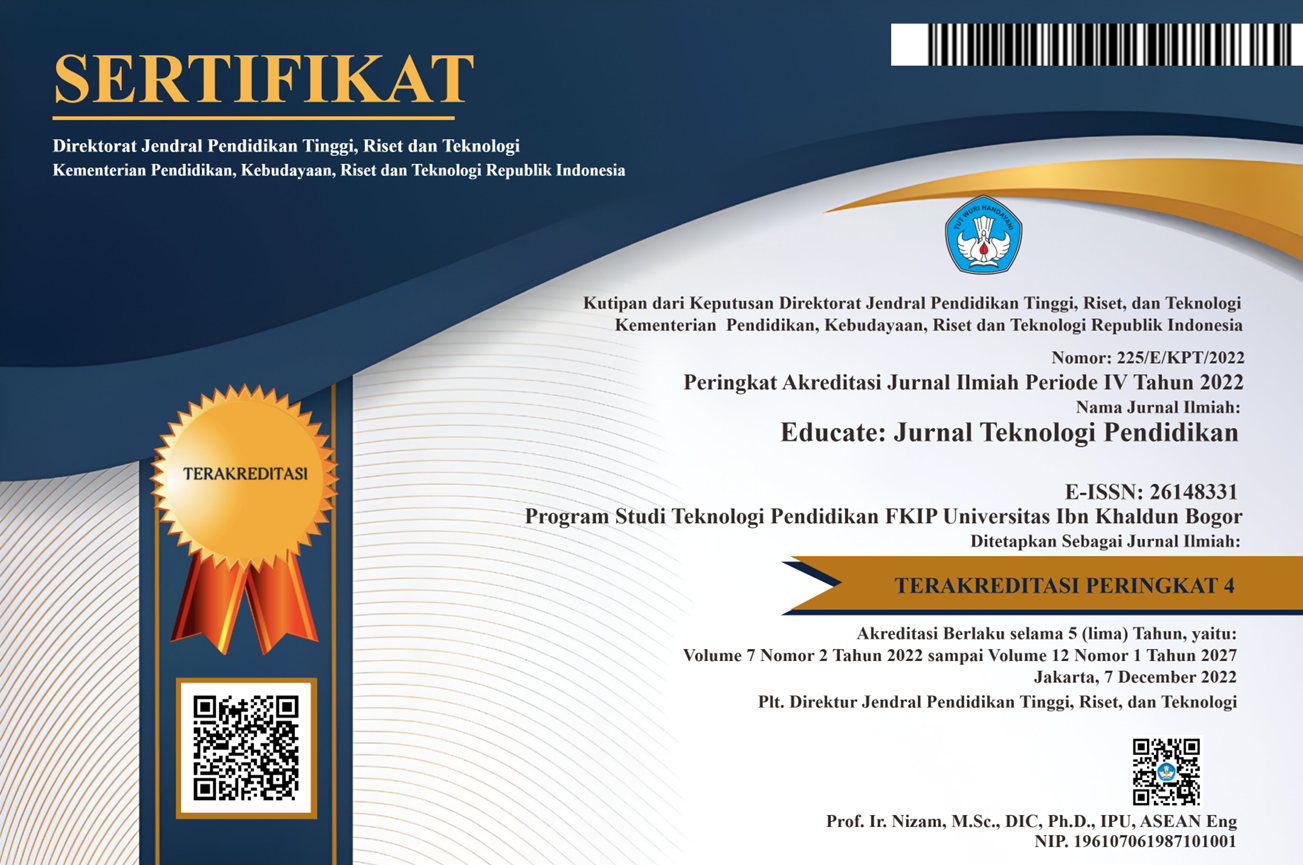PENGARUH IKLIM ORGANISASI TERHADAP KOMITMEN GURU
DOI:
https://doi.org/10.32832/educate.v6i2.5026Keywords:
komitmen guru, iklim organisasi, kepemimpinan collegial.Abstract
Komitmen guru merupakan elemen penting yang berkontribusi pada efektivitas sekolah. Penelitian ini bertujuan untuk mengetahui hubungan antara iklim sekolah dengan komitmen guru dan dampak dari iklim sekolah yaitu kepemimpinan kolegial, prestasi akademik, profesionalisme guru dan kerentanan kelembagaan terhadap komitmen guru. Faktor-faktor tersebut berhubungan langsung dengan efisiensi dan efektivitas sekolah. Organizational Climate Index yang dikembangkan oleh Hoy, Smith, dan Sweetland dan Organizational Commitment Questionnaire yang dikembangkan oleh Mowday, Steers, dan Porter digunakan sebagai instrumen survei. Data dikumpulkan dari 42 guru SMPN 9 Padang untuk penelitian ini. Hasil penelitian menunjukkan adanya hubungan antara iklim sekolah dengan komitmen guru. Hasil analisis regresi menunjukkan bahwa kepemimpinan kolegial dan kerentanan kelembagaan merupakan prediktor komitmen guru. Temuan penelitian ini dapat berkontribusi untuk mengembangkan wawasan bagi administrator sekolah dan kepala sekolah untuk membuat intervensi yang diperlukan untuk mengembangkan iklim sekolah yang positif.
References
Acevedo, N. (2020). Nepantleras building bridges toward college readiness: Latina/o/x educators fostering equity in an urban high school. Education Sciences, 10(4). https://doi.org/10.3390/educsci10040088
Bai, N. (2014). The relationship between school organizational climate and physical education teachers ' burnout ( Case study : Ramian-Iran ). 4(1), 600–602.
Berjaoui, R. R., & Karami-Akkary, R. (2020). Distributed Leadership as a Path to Organizational Commitment: The Case of a Lebanese School. Leadership and Policy in Schools, 19(4), 610–624. https://doi.org/10.1080/15700763.2019.1637900
Cerit, Y. (2010). The effects of servant leadership on teachers' organizational commitment in primary schools in Turkey. International Journal of Leadership in Education, 13(3), 301–317. https://doi.org/10.1080/13603124.2010.496933
Danish, R. Q., Draz, U., & Ali, H. yasir. (2015). Impact of Organizational Climate on Job Satisfaction and Organizational Commitment in Eucation Sector of Pakistan. American Journal of Mobile Systems, Applications and Services, 1(August), 102–109.
Day, C. (2004). A passion for teaching. London: Routledge Falmer.
Dee, J. R., Henkin, A. B., & Singleton, C. A. (2006). Organizational commitment of teachers in Urban schools: Examining the effects of team structures. Urban Education, 41(6), 603–627. https://doi.org/10.1177/0042085906292512
Devos, G., Tuytens, M., & Hulpia, H. (2014). Teachers' organizational commitment: Examining the mediating effects of distributed leadership. American Journal of Education, 120(2), 205–231. https://doi.org/10.1086/674370
Evans, N., & Ferreira, J. A. (2020). What does the research evidence base tell us about the use and impact of sustainability pedagogies in initial teacher education? Environmental Education Research, 26(1), 27–42. https://doi.org/10.1080/13504622.2019.1703908
Fullan, M. (2020). Leadership and Sustainability. Change Forces With A Vengeance, 3(4), 105–120. https://doi.org/10.4324/9780203165805-10
García-Carrión, R., Cuxart, M. P., Alvarez, P., & Flecha, A. (2020). Teacher induction in schools as learning communities: Successful pathways to teachers' professional development in a diverse school serving students living in poverty. Sustainability (Switzerland), 12(17). https://doi.org/10.3390/su12177146
Hallinger, P. (2000). A review of two decades of research on the principalship using the Principal Instructional Management Rating Scale. In annual meeting of the American Educational Research Association, Seattle, WA.
Hoy, W. K., & Miskel, C. G. (1987). Educational administration: Theory, research, and practice (3rd ed.). New York: Random House.
Hoy, W.K., & Miskel, C. G. (2005). Educational administration: Theory, research and practice. (7th ed.). New York: McGraw-Hill.
Hoy, W. K., Sweetland, S. R., & Smith, P. A. (2002). Toward an Organizational Model of Achievement in High Schools: The Significance of Collective Efficacy. Educational Administration Quarterly, 38(1), 77–93. https://doi.org/10.1177/0013161x02381004
Hoy, W. K., Tarter, C. J., & Bliss, J. R. (1990). Organizational Climate, School Health, and Effectiveness: A Comparative Analysis. Educational Administration Quarterly, 26(3), 260–279. https://doi.org/10.1177/0013161X90026003004
Hoy, W. K., & Woolfolk, A. E. (1993). Teachers' Sense of Efficacy and the Organizational Health of Schools. The Elementary School Journal, 93(4), 355–372. https://doi.org/10.1086/461729
ć°klim, í–. (2020). Organisational Climate and Teacher Commitment *. 2(2), 64–70.
Knein, E., Greven, A., Bendig, D., & Brettel, M. (2020). Culture and cross-functional coopetition: The interplay of organizational and national culture. Journal of International Management, 26(2), 100731. https://doi.org/10.1016/j.intman.2019.100731
Koh, W. L., Steers, R. M., & Terborg, J. R. (1995). The effects of transformational leadership on teacher attitudes and student performance in Singapore. Journal of Organizational Behavior, 16(4), 319–333. https://doi.org/10.1002/job.4030160404
Leithwood, K., & Jantzi, D. (2006). Transformational school leadership for large-scale reform: Effects on students, teachers, and their classroom practices. School Effectiveness and School Improvement, 17(2), 201–227. https://doi.org/10.1080/09243450600565829
Louis, K. S. (1998). Effects of Teacher Quality of Work Life in Secondary Schools on Commitment and Sense of Efficacy. School Effectiveness and School Improvement, 9(1), 1–27. https://doi.org/10.1080/0924345980090101
Martínez, M. M., Molina-López, M. M., & de Cabo, R. M. (2020). Explaining the gender gap in school principalship: A tale of two sides. Educational Management Administration and Leadership. https://doi.org/10.1177/1741143220918258
Metle, M. K. (2001). Education, job satisfaction and gender in Kuwait. International Journal of Human Resource Management, 12(2), 311–332. https://doi.org/10.1080/09585190122366
Meyers, B., Meyers, J., & Gelzheiser, L. (2001). Observing Leadership Roles in Shared Decision Making: A Preliminary Analysis of Three Teams. Journal of Educational and Psychological Consultation, 12(4), 277–312. https://doi.org/10.1207/S1532768XJEPC1204_01
Mitchell, M.M, Bradshaw, C.P., L. P. . (2010). Student and Teacher Perceptions of School Climate : A Multilevel. Journal Of School Health, 80(6), 271–279.
Mowday, R. T., Steers, R. M., & Porter, L. W. (1979). The measurement of organizational commitment. Journal of Vocational Behavior, 14(2), 224–247. https://doi.org/10.1016/0001-8791(79)90072-1
Najeemah M Yusof. (2012). School climate and teachers ' commitment : A case study of Malaysia. International Journal of Economics Business and Management Studies, 1(2), 65–75.
Navaridas-Nalda, F., Clavel-San Emeterio, M., Fernández-Ortiz, R., & Arias-Oliva, M. (2020). The strategic influence of school principal leadership in the digital transformation of schools. Computers in Human Behavior, 112, 106481. https://doi.org/10.1016/j.chb.2020.106481
í–zgenel, M., & Aksu, T. (2020). The power of school principals' ethical leadership behavior to predict organizational health. International Journal of Evaluation and Research in Education, 9(4), 816–825. https://doi.org/10.11591/ijere.v9i4.20658
Pearce, C. L., & Herbik, P. A. (2004). Citizenship behavior at the team level of analysis: The effects of team leadership, team commitment, perceived team support, and team size. Journal of Social Psychology, 144(3), 293–310. https://doi.org/10.3200/SOCP.144.3.293-310
Pease, R., Vuke, M., June Maker, C., & Muammar, O. M. (2020). A Practical Guide for Implementing the STEM Assessment Results in Classrooms: Using Strength-Based Reports and Real Engagement in Active Problem Solving. Journal of Advanced Academics, 31(3), 367–406. https://doi.org/10.1177/1932202X20911643
Rebecca J. Collie, Jennifer D. Shapka, N. E. P. (2011). Predicting teacher commitment: The impact of school climate and social–emotional learning. Psychology in the Schools, Vol. 48(10, 1034–1048. https://doi.org/https://doi.org/10.1002/pits.20611
Riehl, C., & Sipple, J. W. (1996). Making the most of time and talent: Secondary school organizational climates, teaching task environments, and teacher commitment. American Educational Research Journal, 33(4), 873–901. https://doi.org/10.3102/00028312033004873
Ryberg, R., Her, S., Temkin, D., Madill, R., Kelley, C., Thompson, J., & Gabriel, A. (2020). Measuring School Climate: Validating the Education Department School Climate Survey in a Sample of Urban Middle and High School Students. AERA Open, 6(3), 233285842094802. https://doi.org/10.1177/2332858420948024
Singh, K., & Billingsley, B. S. (1998). Professional support and its effects on teachers' commitment. Journal of Educational Research, 91(4), 229–239. https://doi.org/10.1080/00220679809597548
Smart, J. C. (2003). Organizational Effectiveness of 2-Year Colleges: The Centrality of Cultural and Leadership Complexity. Research in Higher Education, 44(6), 673–703. https://doi.org/10.1023/A:1026127609244
Smith, L. D. (2009). School climate and teacher commitment. (Doctoral dissertation). University of Alabama, Tuscaloosa, Alabama.
Solihin, E. (2021). DAMPAK GAYA KEPEMIMPINAN KEPALA SEKOLAH PADA KEPUASAN PEKERJAAN GURU DAN MOTIVASI KERJA. Jurnal Imiah Pendidikan Dan Pembelajaran, 5, 2. https://doi.org/http://dx.doi.org/10.23887/jipp.v5i2.34420
Solihin, Eko, & Sukardi, S. (2020). Pengaruh Penerapan Sistem Control Valve Cooler 1 Berbasis Microcontroller ATmega 2560 Terhadap Moisture Pakan After Mixing dengan Bagging Off di PT. Japfa Comfeed Indonesia, Tbk. Unit Padang. JTEV (Jurnal Teknik Elektro Dan Vokasional), 6(2), 80. https://doi.org/10.24036/jtev.v6i2.108549
Song, H., Gu, Q., & Zhang, Z. (2020). An exploratory study of teachers' subjective wellbeing: understanding the links between teachers' income satisfaction, altruism, self-efficacy and work satisfaction. Teachers and Teaching: Theory and Practice, 26(1), 3–31. https://doi.org/10.1080/13540602.2020.1719059
Tsui, K. T., & Cheng, Y. C. (1999). School organizational health and teacher commitment: A contingency study with multi-level analysis. International Journal of Phytoremediation, 21(1), 249–268. https://doi.org/10.1076/edre.5.3.249.3883
Waham, M. A., Rahman, R. A., & Mustaffa, W. S. W. (2020). The effect of transformational leadership on organizational performance through the mediating role of organizational culture in higher education institutions in Iraq. International Journal of Psychosocial Rehabilitation, 24(8), 13638–13651. https://doi.org/10.37200/IJPR/V24I8/PR281352
Downloads
Published
How to Cite
Issue
Section
License
Copyright (c) 2021 Eka Khairani

This work is licensed under a Creative Commons Attribution 4.0 International License.
| Authors grant the journal copyright of the work licensed under CC-BY-SA or The Creative Commons Attribution–ShareAlike License that allows others to share the work with an acknowledgement of the work's authorship and initial publication in this journal. | Penulis memberikan hak cipta karyanya kepada jurnal yang dilisensikan dengan CC-BY-SA or The Creative Commons Attribution–ShareAlike License yang memungkinkan orang lain untuk menggunakan karya dengan pengakuan kepengarangan karya dan publikasi awal dalam jurnal ini. |









